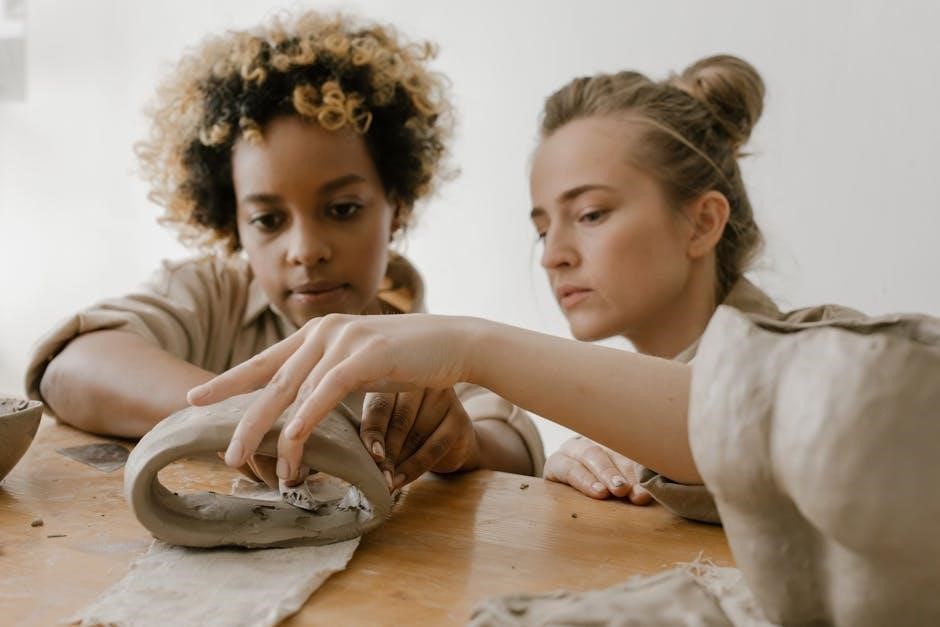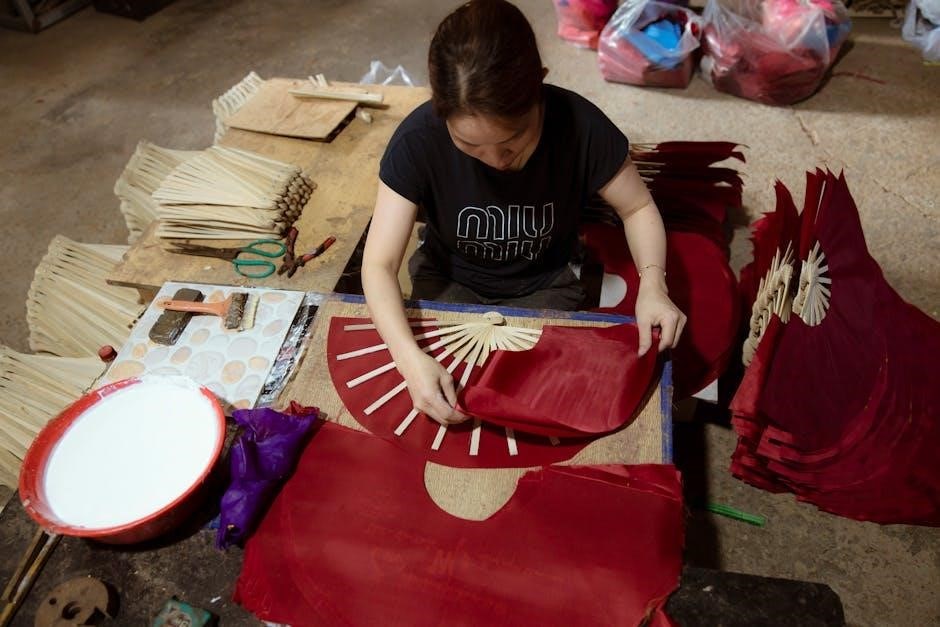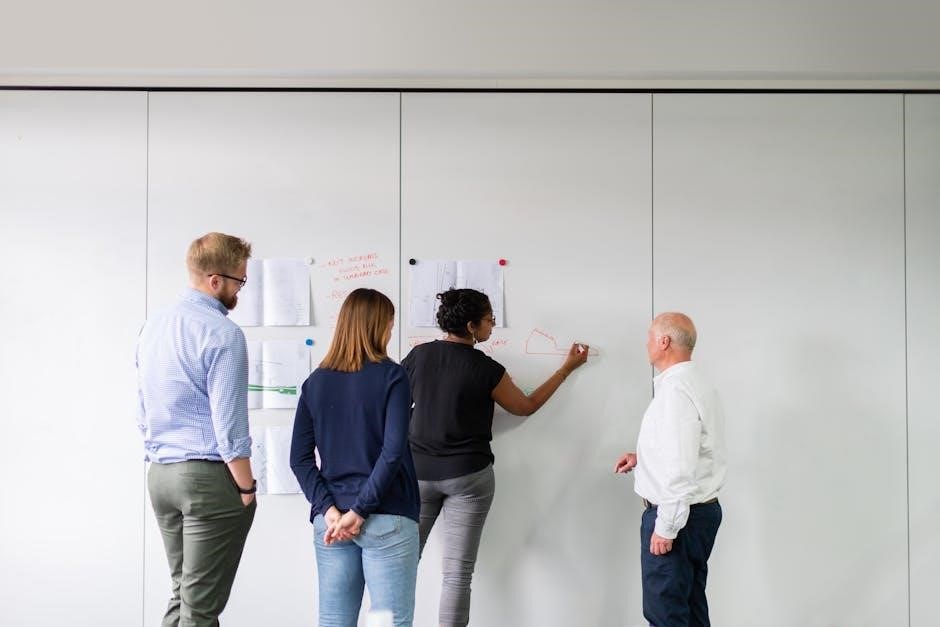instructional skills workshop
The Instructional Skills Workshop (ISW) is a three-day intensive program designed to strengthen instructors’ skills in student-centred teaching, enhancing their effectiveness and confidence in the classroom.
1.1 Definition and Purpose
The Instructional Skills Workshop (ISW) is a comprehensive, interactive program designed to enhance educators’ teaching effectiveness. Its primary purpose is to equip instructors with practical techniques and strategies to create engaging, student-centered learning environments. Through hands-on activities and collaborative discussions, participants gain confidence in implementing innovative teaching methods. The workshop focuses on fostering active participation, critical thinking, and problem-solving skills among students, ensuring educators are well-prepared to meet diverse learner needs and improve overall educational outcomes.
1.2 Importance of Instructional Skills in Education
Instructional skills are vital for creating effective learning environments that foster student engagement, understanding, and success. Educators with strong instructional skills can adapt to diverse student needs, promoting inclusivity and active participation. By mastering these skills, instructors can enhance teaching effectiveness, improve student outcomes, and cultivate a culture of continuous learning. Effective instructional strategies ensure that educators are equipped to address challenges, inspire critical thinking, and prepare students for real-world applications, ultimately enriching the educational experience for all participants.
Structure of an Instructional Skills Workshop
The workshop is typically a three-day intensive program, combining interactive discussions, hands-on activities, and practical teaching strategies to enhance instructional effectiveness and participant engagement.
2.1 Overview of the Workshop Format
The Instructional Skills Workshop is a three-day intensive program combining interactive discussions, hands-on activities, and practical teaching strategies. Participants engage in problem-solving tasks, peer feedback sessions, and reflective practices to enhance their teaching skills. The format includes demonstrations, group work, and individual presentations, fostering a collaborative learning environment. This structured approach ensures participants gain actionable insights and confidence in applying new techniques to their teaching practices, creating a dynamic and supportive setting for professional growth.
2.2 Duration and Intensity of the Program
The Instructional Skills Workshop is typically a three-day program, designed to be intensive and immersive. It combines interactive sessions, hands-on exercises, and collaborative activities to maximize learning. The structured schedule ensures participants engage deeply with content, applying practical skills immediately. This condensed format allows educators to gain comprehensive insights and techniques within a short timeframe, fostering a dynamic and focused learning experience tailored to enhance teaching effectiveness. The intensity ensures active participation and meaningful engagement throughout the program.
Key Objectives of the Workshop
The workshop aims to enhance teaching effectiveness, develop student-centered skills, and encourage active participation, equipping educators with practical techniques to improve learning outcomes and engagement.
3.1 Enhancing Teaching Effectiveness
The workshop focuses on enhancing teaching effectiveness by providing instructors with practical strategies to improve student learning. Through formative assessments, problem-solving activities, and collaborative learning, educators gain tools to create engaging lessons. The program emphasizes creating an inclusive environment, encouraging active participation, and fostering critical thinking. By integrating these techniques, instructors can deliver high-quality education, ensuring students achieve better academic outcomes and develop essential skills for real-world applications.
3;2 Developing Student-Centered Teaching Skills
The workshop emphasizes student-centered teaching, where instructors learn to shift focus from lecture-based methods to interactive, inclusive approaches. Participants explore strategies to create engaging lessons that encourage active participation and real-world problem-solving. By incorporating formative assessments and collaborative learning techniques, educators develop the ability to adapt their teaching to diverse student needs, fostering a dynamic and inclusive learning environment that prioritizes student engagement and meaningful skill development.
3.3 Encouraging Active Participation and Engagement
‘ for the topic ‘instructional skills workshop’. The user has provided a lot of guidelines, so I need to make sure I follow them closely.
Looking back at the previous responses, the earlier sections dealt with definitions, purposes, and developing student-centered skills. So, I need to ensure that this new section doesn’t overlap with those topics. The focus here should be on active participation and engagement techniques.
I remember from the provided internet search that the Instructional Skills Workshop (ISW) uses techniques like formative assessments, problem-solving activities, and collaborative learning. I should incorporate these elements into the response. The user also emphasized the importance of creating a safe and inclusive environment, which encourages participation.
I need to structure the paragraph to highlight these aspects. Maybe start by mentioning the techniques used, then talk about the environment, and conclude with the outcomes. I should ensure it flows well and stays within the word limit.
Let me draft it: “The workshop employs techniques like formative assessments and problem-solving activities to foster active participation. Collaborative learning approaches encourage peer interaction, creating a safe and inclusive environment. These methods ensure students are engaged, think critically, and apply knowledge practically. The focus is on creating a dynamic where students feel comfortable contributing, leading to deeper engagement and better learning outcomes.”
Now, checking the word count: exactly. I think that covers the necessary points without overlapping with other sections. Time to present the response.
Teaching Methods and Techniques
The workshop incorporates formative assessments, problem-solving activities, and collaborative learning to enhance teaching effectiveness. These methods promote active engagement and practical application of skills.
4.1 Formative Assessment Strategies
Formative assessment strategies in the Instructional Skills Workshop involve real-time feedback, self-assessment, and peer review. These techniques help instructors identify areas for improvement, adjust teaching methods, and monitor student progress. By integrating these strategies, educators can create a dynamic learning environment that fosters growth and understanding. Participants learn to use tools like quick assessments and reflective practices to enhance student engagement and outcomes. This approach ensures continuous improvement in both teaching and learning processes, making it a cornerstone of the workshop’s effectiveness.
4.2 Incorporating Problem-Solving Activities
Incorporating problem-solving activities into the Instructional Skills Workshop engages participants in real-world scenarios, fostering critical thinking and collaboration. These activities encourage learners to apply theoretical knowledge to practical challenges, enhancing their ability to adapt and innovate. By designing tasks that require creative solutions, instructors help participants develop resilience and resourcefulness. This approach not only enhances teaching skills but also prepares educators to address diverse classroom situations effectively, promoting dynamic and interactive learning environments for their students.
4.3 Using Collaborative Learning Approaches
Collaborative learning approaches in the Instructional Skills Workshop foster teamwork and communication among participants. By engaging in group discussions, peer teaching, and shared problem-solving, educators develop strategies to create inclusive and interactive classrooms. These methods encourage active participation, mutual respect, and diverse perspectives, enhancing both teaching and learning experiences. Collaborative activities also help participants build confidence in facilitating dialogue and managing group dynamics, ultimately improving their ability to engage students effectively in real-world educational settings;

Role of the Instructor in the Workshop
The instructor guides participants through interactive activities, models effective teaching techniques, and provides feedback to enhance their instructional skills in a supportive learning environment.
5.1 Facilitating Interactive Discussions
Facilitating interactive discussions involves creating a safe, inclusive environment where participants engage in meaningful dialogue. Instructors encourage peer-to-peer learning, active participation, and critical thinking through open-ended questions and collaborative activities. They model effective communication strategies, ensuring diverse perspectives are heard and valued. By guiding discussions thoughtfully, instructors help participants connect new ideas to their existing knowledge, fostering deeper understanding and practical application of teaching skills. This approach enhances both teaching confidence and student engagement in the classroom.
5.2 Providing Constructive Feedback
Providing constructive feedback is essential for helping participants improve their teaching skills. Instructors use specific, timely, and actionable comments to guide reflection and growth. Feedback focuses on strengths and areas for development, fostering a supportive environment. Participants are encouraged to reflect on their practices, aligning feedback with workshop objectives. This process enhances teaching confidence and effectiveness, ensuring participants can apply new strategies in real-world classroom settings with clarity and purpose.
5.3 Encouraging Reflection and Self-Assessment
Encouraging reflection and self-assessment empowers participants to critically evaluate their teaching practices. Through guided discussions, journaling, and peer interactions, participants gain insights into their strengths and areas for growth. Instructors create a safe space for open dialogue, helping participants connect theoretical concepts to real-world applications. This reflective process fosters a deeper understanding of teaching strategies, enhances confidence, and promotes continuous improvement in instructional skills, aligning with the workshop’s goal of developing effective educators.

Engaging Participants in the Learning Process
Engaging participants involves creating interactive activities, fostering collaboration, and using real-world scenarios to promote active learning. This approach ensures participants are motivated, involved, and invested in their development, enhancing the workshop’s effectiveness and their overall learning experience.
6.1 Creating a Safe and Inclusive Environment
Creating a safe and inclusive environment is crucial for fostering engagement and learning. This involves promoting respect, encouraging open communication, and ensuring all participants feel valued. Instructors can achieve this by setting clear expectations, using inclusive language, and addressing diverse needs. A safe space allows participants to take risks, share ideas, and collaborate without fear of judgment, enhancing their overall workshop experience and fostering a sense of belonging.
6.2 Encouraging Peer-to-Peer Learning
Encouraging peer-to-peer learning fosters collaboration and mutual understanding among participants. Instructors can facilitate this by pairing individuals with complementary skills or perspectives, promoting group discussions, and encouraging shared problem-solving. This approach not only enhances communication skills but also allows participants to learn from each other’s experiences and insights. Peer-to-peer learning creates a dynamic environment where individuals feel supported and motivated, leading to increased engagement and a deeper understanding of the material being covered.
6.3 Using Real-World Scenarios for Practical Application
Integrating real-world scenarios into the workshop allows participants to apply theoretical concepts to practical situations. This approach bridges the gap between theory and practice, enabling educators to see how instructional strategies can be effectively implemented in actual classroom settings. By engaging with realistic case studies and simulations, participants gain hands-on experience, enhancing their ability to adapt and apply new teaching methods to diverse educational environments, making the learning process more relevant and impactful.

Assessment and Evaluation Strategies
Assessment and evaluation strategies in ISWs focus on measuring participant progress and understanding. Formative assessments and feedback loops help refine teaching methods, ensuring effective skill development and application.
7.1 Measuring Participant Progress
Measuring participant progress involves formative assessments and feedback loops to track development. Activities like role-playing, problem-solving tasks, and peer reviews help gauge understanding and skill application. Participants receive constructive feedback, enabling them to refine their teaching strategies. Progress is also assessed through self-reflection and the application of new techniques in real-world scenarios, ensuring continuous improvement and alignment with workshop objectives.
7.2 Implementing Feedback Loops
Feedback loops are essential for continuous improvement, allowing participants to reflect on their teaching practices. Instructors provide constructive feedback through observations, peer reviews, and self-assessment tools. Participants engage in iterative cycles of feedback, enabling them to refine their skills and adapt new strategies. This process fosters growth, ensuring alignment with workshop objectives and promoting long-term development in teaching effectiveness.
Benefits of Participating in the Workshop
Participants gain improved teaching confidence, enhanced classroom management skills, and the ability to engage students more effectively, leading to better learning outcomes and increased student engagement.
8.1 Improved Teaching Confidence
Participating in an Instructional Skills Workshop significantly boosts teaching confidence by providing instructors with practical strategies and techniques. Through interactive sessions and feedback, educators gain clarity in lesson delivery and classroom management. The workshop emphasizes formative assessments and active engagement, empowering instructors to adapt to diverse learning needs. By mastering these approaches, participants feel more assured in their ability to create inclusive and effective learning environments, ultimately enhancing their teaching prowess and student interactions.
8.2 Enhanced Classroom Management Skills
Instructional Skills Workshops equip educators with strategies to manage classrooms effectively, fostering a productive and respectful learning environment. Participants learn techniques to engage students, minimize disruptions, and maintain focus. The workshop emphasizes active participation, formative assessments, and problem-solving activities to enhance classroom dynamics. By mastering these skills, instructors create structured yet flexible spaces that encourage collaboration and accountability, leading to improved student behavior and academic outcomes. Practical tools and feedback loops further support long-term implementation of effective classroom management strategies.
8.3 Better Student Outcomes and Engagement
Instructional Skills Workshops lead to improved student outcomes by fostering active participation and deeper engagement. Educators learn to integrate formative assessments, problem-solving activities, and collaborative learning, which enhance students’ critical thinking and academic performance. By creating inclusive environments and using real-world scenarios, instructors motivate students to take ownership of their learning. This results in higher levels of engagement, better retention of material, and overall improved educational outcomes, preparing students to succeed in diverse and dynamic learning environments.

Real-World Applications of Workshop Skills
Educators apply workshop skills in real-world settings by integrating formative assessments, problem-solving activities, and collaborative learning into their teaching practices, adapting strategies for diverse learning environments effectively.
9.1 Integrating New Techniques into Daily Teaching
Educators apply workshop techniques in daily teaching by incorporating formative assessments, problem-solving activities, and collaborative learning. These methods enhance student engagement and understanding, fostering a dynamic classroom environment. Participants learn to adapt strategies to diverse settings, ensuring inclusivity and addressing varied learner needs. By integrating these approaches, instructors create a supportive space for students to think critically and apply knowledge practically, leading to improved academic outcomes and increased confidence in both teaching and learning processes.
9.2 Adapting Strategies for Diverse Learning Environments
Educators adapt workshop strategies to suit various learning environments by tailoring techniques like formative assessments and collaborative learning. These methods are flexible, allowing instructors to address diverse student needs, whether in-person, online, or hybrid settings. By adjusting activities to fit different contexts, educators ensure inclusivity and engagement, fostering a supportive environment that caters to all learners. This adaptability enhances teaching effectiveness and promotes better student outcomes across diverse educational settings and student populations.

Participant Perspectives and Experiences
Participants often share positive testimonials about the workshop, highlighting improved teaching confidence and practical skills application. Feedback underscores the program’s transformative impact on their educational practices.
10.1 Testimonials from Past Participants
Past participants often highlight the transformative impact of the Instructional Skills Workshop, sharing testimonials about increased confidence and improved teaching practices. Many cite the practical, hands-on approach as a key factor in their success. Participants frequently mention how the workshop helped them develop student-centered teaching strategies and enhance classroom engagement. The supportive environment and collaborative learning opportunities are also often praised. Overall, the feedback underscores the workshop’s effectiveness in fostering professional growth and creating a lasting positive impact on teaching practices.
10.2 Common Challenges Faced by Participants
Participants often face challenges such as time constraints, balancing theory with practical application, and adapting to diverse learning environments. Some find it difficult to immediately apply new techniques in their own classrooms. Additionally, managing group dynamics and receiving constructive feedback can be intimidating for some. Despite these challenges, the supportive structure of the workshop helps participants navigate these obstacles and grow as educators.

Evaluating the Effectiveness of the Workshop
Evaluation involves assessing participant learning through feedback, assessments, and long-term impact on teaching practices, ensuring the workshop achieves its goals of improving instructional skills effectively.
11;1 Quantitative and Qualitative Metrics
Evaluation employs both quantitative and qualitative methods to assess workshop effectiveness. Quantitative metrics include participant satisfaction scores, pre- and post-assessment comparisons, and retention rates. Qualitative feedback, such as participant testimonials, instructor observations, and self-assessment reports, provides deeper insights into skill development and teaching improvements.
11.2 Long-Term Impact on Teaching Practices
The Instructional Skills Workshop (ISW) fosters long-term improvements in teaching practices by equipping educators with sustainable skills. Participants often report continued use of active engagement techniques and formative assessments, leading to enhanced teaching effectiveness. The workshop’s emphasis on reflective practice encourages instructors to adapt and refine their methods, promoting a culture of continuous improvement. Over time, these changes contribute to more dynamic classrooms and better student outcomes.
Instructional Skills Workshops empower educators with practical techniques and confidence, fostering effective teaching and meaningful learning experiences.
12.1 Summarizing Key Takeaways
The Instructional Skills Workshop equips educators with practical techniques to enhance teaching effectiveness, fostering student engagement and active participation. By integrating formative assessments, problem-solving activities, and collaborative learning, instructors gain confidence and develop adaptable teaching strategies. The workshop emphasizes creating inclusive environments and encouraging reflection, enabling participants to refine their teaching styles and improve student outcomes. These key takeaways empower educators to continuously grow and adapt in their professional roles, ensuring impactful and meaningful learning experiences.
12.2 Encouraging Continuous Professional Development
The Instructional Skills Workshop serves as a catalyst for ongoing professional growth, empowering educators to continually refine their teaching practices. By fostering a mindset of lifelong learning, participants are encouraged to explore new strategies, reflect on their experiences, and adapt to evolving educational needs. This commitment to development ensures that instructors remain effective, innovative, and responsive to the diverse needs of their students, ultimately enhancing the quality of education they provide.

Future Directions for Instructional Skills Workshops
Future directions include incorporating AI, virtual reality, and hybrid learning to enhance accessibility and engagement, ensuring workshops meet diverse educator needs globally and foster continuous improvement.
13.1 Innovations in Workshop Design
Innovations in workshop design include integrating AI-driven personalized learning paths, virtual reality simulations for immersive training, and hybrid learning models. These advancements aim to cater to diverse learning preferences and schedules. Incorporating microlearning modules and gamification elements can enhance engagement. Additionally, leveraging real-time feedback tools and collaborative platforms fosters a dynamic learning environment. These innovations ensure that instructional skills workshops remain relevant, accessible, and effective in preparing educators for future challenges in teaching and learning environments.
13.2 Expanding Accessibility and Reach
Expanding accessibility and reach involves leveraging online platforms to deliver workshops globally, ensuring educators in remote or underserved areas can participate. Offering multilingual support and adaptable content allows for greater inclusivity. Partnerships with educational institutions and organizations help broaden the program’s availability. By embracing technology and diverse delivery formats, the Instructional Skills Workshop can empower a wider audience of educators, fostering improved teaching practices worldwide and addressing the unique needs of diverse learning environments and cultures.
